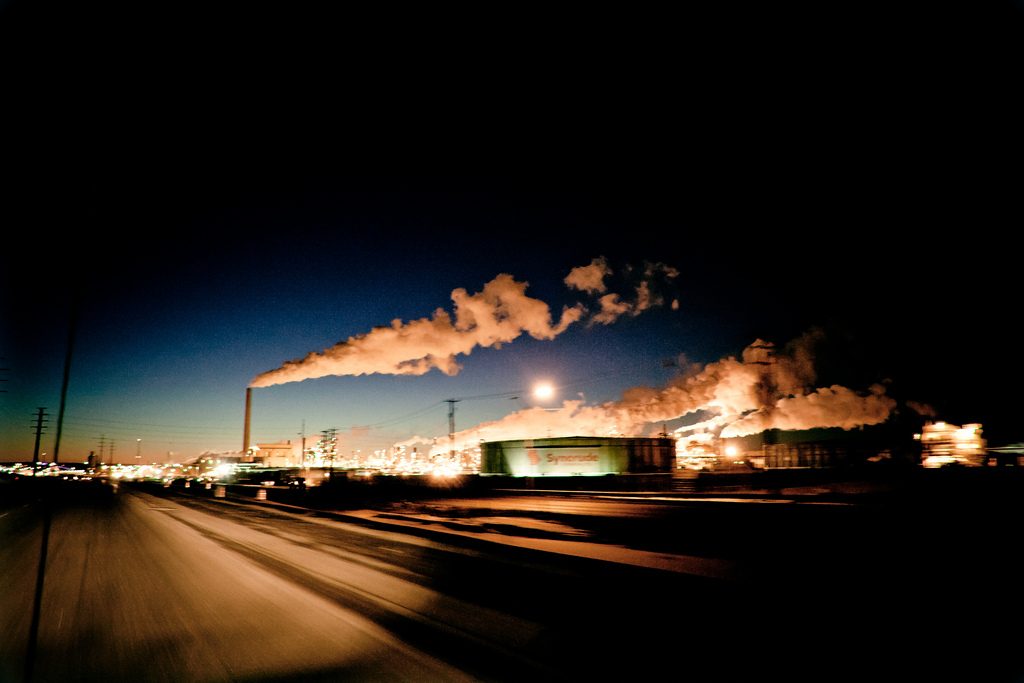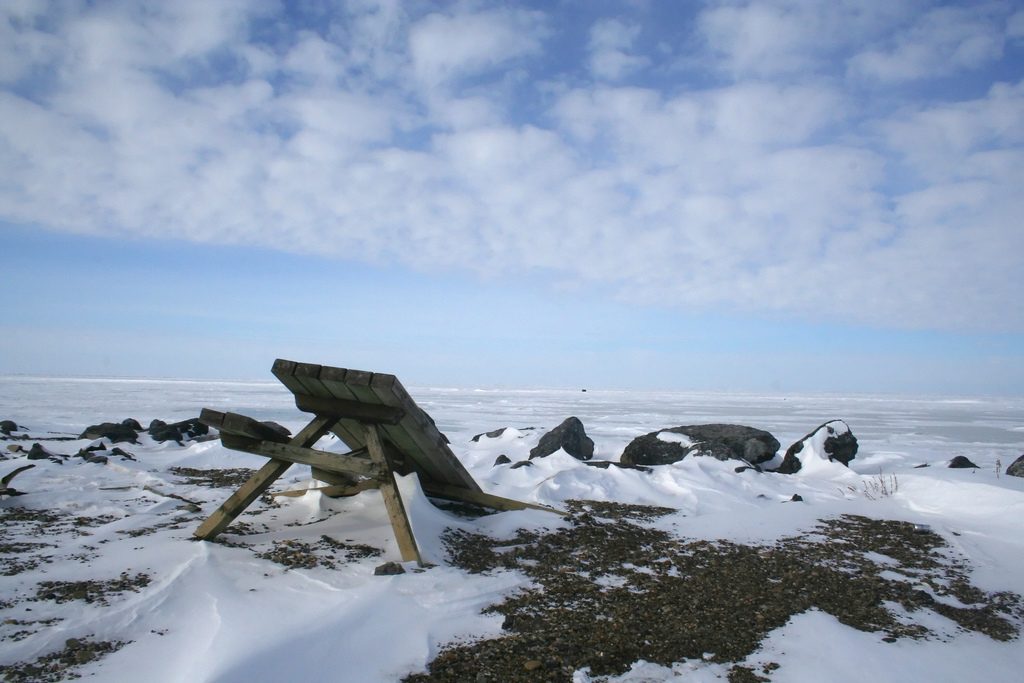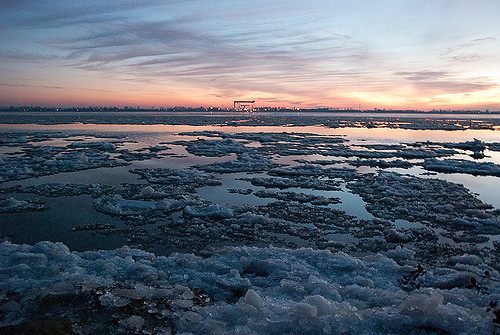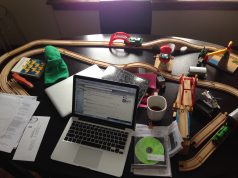
As a Canadian who lives in the UK, whenever I confirm that my accent is not American, a bit of friendly banter ensues. People love Canada. I’m not used to be being ashamed of my country in an international context. This year, that’s changed.
For a week this September, the London Theatre Consortium, consisting of the Young Vic, the Royal Court, Battersea Arts Centre, the Donmar and the Almeida, each sent a different artist to Hawkwood College for a week long seminar on Climate Change. Over the course of this very intense week, we were exposed to a series of speakers who explained the urgency of what’s happening to the planet, and how good human beings have become at pretending it isn’t happening.
I recognised myself in this pretending. I primarily went to the lab not because I saw myself as an environmentally motivated artist, but because I was invited to go by the Royal Court. I spent the first two days desperately trying to hold the information at arm’s length – to see it as an artistic catalyst as opposed to a vortex we’re all slowly falling into. I feared that if I really accepted what I was learning into my heart and mind, I would… I don’t know…
Need to change everything?
Never sleep again?
I wouldn’t have necessarily predicted that I would become repulsed by the country that I called home.
Much of what we learned on the lab you’ve likely heard before.
The Paris Climate Summit was largely a failure – too little too late – made worse by the fact that most of the countries who desperately need to “stick to the plan” are not meeting their targets, not to mention Donald Trump’s recent withdrawal.
Ocean levels are rising, we’re on an express route to the global temperature going up by more than 2 degrees in the next two decades, which will make the planet as we know it largely unimaginable.
Climate Change is an intersectional issue, tied up with racism, sexism, colonialism, human rights, refugees, and global inequity.

What shook me to my core, however, was the irrefutable realisation around just how much of this Canada is disproportionately responsible for.
Most of the worst climate offenders in the world are rich nations in the North. Because of some sick cosmic justice (also known as science) – the North is where the impact of these actions will take longest to manifest. Meanwhile, emissions from Northern countries threaten to eradicate smaller, poorer countries along the equator within the next ten years. Countries who are not really putting carbon emissions into the atmosphere because their economies are small and developing will disappear because of the actions of larger, richer nations, like ours.
Think of the world as one big apartment building.
The people in the penthouse throw massive parties every night. The people in the rest of the building don’t – they eat in. Yet somehow the mess from the penthouse only ever appears in the smaller, quieter apartments, even though their tenants don’t attend the parties. Their apartments are filling up with the penthouse’s junk, and when the penthouse revellers do pass by that mess, they find themselves thinking, “There’s no way that the consequences of my actions are going to another part of the building.”
Nations are constructs, not finite places. The world as one planet, as one finite place that billions of human beings inhabit together, is a fact. The middle of the planet is paying the price for the actions of the top of the planet. The penthouse is trashing the entire building, and Canada is one of three countries partying hardest, loudest and longest.
On the penultimate day of the lab, a human rights lawyer named Polly Higgins spoke with us. She told us about a road trip she’d taken with a first nations friend of hers in Western Canada this summer where her friend described the Wendigo to Polly – a mythical Algonquin monster that is greedy and eats everything in sight, until eventually it consumes itself. She warned Polly that in Western Canada they would travel through “the belly of the Wendigo.”
Canada is the 9th highest contributor to carbon emissions in the world. And per capita, we are the third highest contributor.
I’m just going to let that sink in for a moment.
There are 195 countries in the world.
We are 3rd per capita, 9th overall. That’s very high. It’s higher overall than Saudi Arabia. It’s higher than the United Kingdom. It’s higher than Brazil, who are destroying the Amazon. While Amanda Zimm proudly declared that we ought to “Recycle, Reduce and Reuse” on the 90s show Ready or Not, our country was actively destroying the rest of the world, selling most of its environmentally minded citizens on distractions rooted in individualism like composting and recycling programmes.

Canada’s climate damage does not stop with Carbon Emissions. If you haven’t looked into what fracking actually is (fracturing deep rock formations) and the numerous instances where it poisoned groundwater and vulnerable communities, created earthquakes and a host of other unfixable problems if it goes wrong, not only in Canada but throughout the world, you should. That’s without mentioning the oil sands, or the arctic, or our government celebrating the opportunity to do business with Brazil’s new president when he logs the Amazon, or how our judicial system coludes with big businesses all over the world to protect them from having to face up to the consequences of ecocide.
(To give just one example, in April of this year an Ontario court proudly overturned a case that Ecuadorian villagers spent decades fighting against Chevron. This was for environmental damage that caused widespread cancer in their community.)
It’s no coincidence that Canada’s Wendigo targets areas populated by Indigenous people for most of its climate atrocities. Many conservative voters see these populations’ eye witness accounts of the damage as an “Indigenous issue” – unfixable because of the country’s unpayable colonial debt that those particular voters have no interest in attempting to address. Those voters, unempathetic as they are, do need to know – This is both an Indigenous issue and the entire world’s issue. Our government has spent decades propping up our economy on big industries that will make their grandchildren’s lives unimaginable.
(Recently my 9 year old nephew asked me what Climate Change was. When I explained it, he started to cry. I told him hopeful things. Things that felt a lot like lies. I have to try to make the things I told him true. And I can’t try to make them true, until I ask that we all really start pointing our fingers in the right direction.)
I’m darkly reminded of a Mitchell and Webb comedy sketch, set in the second world war, where they look at each other’s uniforms and notice they both have a skull and crossbones on their hats, then look at each other incredulously and say, “Wait a minute, are we the bad guys?”
It’s time to face facts. As far as the climate goes, we have been the bad guys for decades. So what can we do?
As theatre makers we can tell people. We can do our research, look into it, tell people we know, ask them to look into it, and as citizens and artists, make work and action and waves that hold our governments accountable for what’s really happening, while there’s still time.
I may be ashamed of my country, but I have faith in its people.









